|
|
|
Sort Order |
|
|
|
Items / Page
|
|
|
|
|
|
|
| Srl | Item |
| 1 |
ID:
152079


|
|
|
|
|
| Summary/Abstract |
This article examines the role of ideological mechanisms in support of long-term economic liberalisation. Specifically we examine the ideological roles of comparative advantage and debt reduction as precursors to austerity policy imposition. Austerity policies, as episodic mechanisms designed to deepen neoliberalisation, are examined in the comparative historical context of Africa and Latin America.
|
|
|
|
|
|
|
|
|
|
|
|
|
|
|
|
| 2 |
ID:
154078
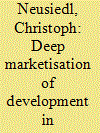

|
|
|
|
|
| Summary/Abstract |
This article introduces the concept of ‘deep marketisation’ as a relatively new, contemporary phase of neoliberal development policy in Bangladesh. By looking into the development strategy of the country’s energy sector, the article shows how an emphasis on marketisation through public-private partnerships (PPPs) and other strategies advances a market fundamentalist agenda to strengthen the private sector and establish a world market. By drawing on interviews with development practitioners from various development organisations in Bangladesh, the article further reveals how development conceptualisations are shaped by the strategy of deep marketisation, leading to the impoverishment of development by constraining its field of actions to measures based on the primacy of economic growth and private sector-led economic development, at the same time leading to a re-legitimisation of flawed neoliberal development policies that result in further inequality, poverty and environmental degradation.
|
|
|
|
|
|
|
|
|
|
|
|
|
|
|
|
| 3 |
ID:
080468


|
|
|
|
|
| Publication |
2007.
|
| Summary/Abstract |
In addition to a geopolitics of containment model of immigration policing at the Mexico-US border, US immigration-related statecraft has incorporated a geopolitics of engagement model in which spaces previously at arms reach from US immigration authorities and at some remove from the border have been aggressively brought into the purview of US immigration enforcement. These newly engaged spaces are at once local (i.e., US cities) and regional (i.e., Mexico, Central America and the Caribbean Basin). This shift has in large part been a response to the tension between trade and security at the border, and thus allows us to see differently how statecraft is being multiplied, reactivated and transformed at and away from the border in light of the war on terrorism and its complex relationship with economic globalisation and the neoliberalisation of the Mexico-US border region.
|
|
|
|
|
|
|
|
|
|
|
|
|
|
|
|
| 4 |
ID:
149441
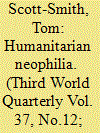

|
|
|
|
|
| Summary/Abstract |
This paper critically examines the ‘humanitarian innovation’ movement, arguing that it represents a departure from classical principles and the entry of a distinctive new ideology into the sector. Labelling this ‘humanitarian neophilia’, the paper argues that it has resonances of Barbrook and Cameron’s ‘Californian Ideology’, with its merging of New Left and New Right within the environs of Silicon Valley. Humanitarian neophilia, similarly, comes from a diverse ideological heritage, combining an optimistic faith in the possibilities of technology with a commitment to the power of markets. It both ‘understates the state’ and ‘overstates the object’, promoting a vision of self-reliant subjects rather than strong nation-states realising substantive socioeconomic rights.
|
|
|
|
|
|
|
|
|
|
|
|
|
|
|
|
| 5 |
ID:
141893


|
|
|
|
|
| Summary/Abstract |
The EU has loudly voiced its intention to facilitate poverty reduction and democratisation in North Africa. In particular, it seeks to conclude Deep and Comprehensive Free Trade Agreements (DCFTAs) with Tunisia, Morocco and Egypt. These are seen as a vital response to the Arab Spring – integrating North African countries into the globalised economy. Applying a moral economy perspective, this article argues, however, that, while ‘Normative Power Europe’ seeks to build more tranquil societies in the region, its trade policies nevertheless threaten to exacerbate poverty and social unrest. The prospect of de-industrialisation in the wake of FTAs will do much to entrench economic asymmetries between the European metropole and its neighbours.
|
|
|
|
|
|
|
|
|
|
|
|
|
|
|
|
| 6 |
ID:
142660
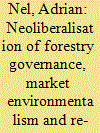

|
|
|
|
|
| Summary/Abstract |
There is often a disjuncture between idealised forestry governance models which posit a ‘win-win for community and environment’ through participatory, multi-stakeholder international development discourses and interventions – and the actually existing processes and structures of natural resource government through which they are articulated. By applying, first, established theorisations of the initial territorialisation of state forestry territory, then conceptualisations of re- and de-territorialisation, derived from Deleuzo-Guattarian formulations, this paper expands on post-structuralist lines of inquiry on the political ecology of forestry to explore substantive transformations in forestry governance in Uganda. It specifically details the role that market environmentalism – the extension of market mechanisms, including carbon forestry, to natural resource governance – plays in reorienting assemblages of actors engaged in forestry governance and in changing configurations of state forestry territory.
|
|
|
|
|
|
|
|
|
|
|
|
|
|
|
|
| 7 |
ID:
162626


|
|
|
|
|
| Summary/Abstract |
This reflective contribution discusses the intersection of Indigenous and Small Scale Fisheries’ (SSF) issues, and how the international SSF movement has a critical role in the broader struggle for the convergence of social justice regarding the environment, food and lifeways. I explore some of the political tensions around Indigenous and SSF struggles against global neoliberalisation of land and water resources, some of the successes and challenges of the international SSF movement, and future considerations for academic/activist ‘decolonising’ work.
|
|
|
|
|
|
|
|
|
|
|
|
|
|
|
|
| 8 |
ID:
162627
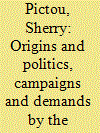

|
|
|
|
|
| Summary/Abstract |
This reflective contribution discusses the intersection of Indigenous and Small Scale Fisheries’ (SSF) issues, and how the international SSF movement has a critical role in the broader struggle for the convergence of social justice regarding the environment, food and lifeways. I explore some of the political tensions around Indigenous and SSF struggles against global neoliberalisation of land and water resources, some of the successes and challenges of the international SSF movement, and future considerations for academic/activist ‘decolonising’ work.
|
|
|
|
|
|
|
|
|
|
|
|
|
|
|
|
| 9 |
ID:
157709
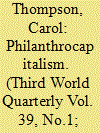

|
|
|
|
|
| Summary/Abstract |
Engaging the lively debates about the next expression of neoliberalism, this study suggests that it is evolving into philanthrocapitalism. After a brief discussion of the trajectories from neoliberalism, the article addresses the core ideology of philanthrocapitalism. The central thesis explores how philanthrocapitalism is moving beyond the requirement of ‘business practices’ for recipients of donor funds, into enforcing ‘business rule’ on to the public domain. Although philanthrocapitalism is most debated in the fields of health care and education, this article uses empirical analysis of international agricultural policies trying to enlist Southern Africa policies. It explores how philanthrocapitalist rule is reducing transparency, participation and deliberation within the public domain, well beyond requesting efficient business practices for greater food security. It concludes with how smallholder farmers are actively organising to resist business rule over their genetic resources and farming practices.
|
|
|
|
|
|
|
|
|
|
|
|
|
|
|
|
| 10 |
ID:
149437
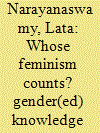

|
|
|
|
|
| Summary/Abstract |
Gender and development (GAD) has become a transnational discourse and has, as a result, generated its own elite elements. This elitism has tended to be attributed to a Northern hegemony in how feminism has been articulated and then subsequently professionalised and bureaucratised. What has received less attention, and what this paper highlights empirically, is how Southern-based feminisms might themselves be sites of discursive exclusion. The paper interrogates these concerns through an analysis of how professionalisation is evidenced in feminist engagement among civil society organisations working on gender in New Delhi. The analysis suggests that efforts to create spaces for subaltern voices are constrained not only by the disciplining effects of neoliberal frameworks but also – and in tandem – by Southern elite feminist priorities. The implications of these findings are significant: processes of professionalisation and the elitism they engender may have the effect of potentially precluding the engagement of those people on the margins whose voices are so sought after as part of efforts to facilitate inclusive development.
|
|
|
|
|
|
|
|
|
|
|
|
|
|
|
|
| 11 |
ID:
166696


|
|
|
|
|
| Summary/Abstract |
This paper examines methodological avenues for a historical sociology of development through a close reading of Naomi Hossain’s recent book, The Aid Lab: Understanding Bangladesh’s Unexpected Success (2017). Hossain’s conjunctural perspective, the formative moment of Bangladesh in environmental catastrophe, war and famine in the 1970s, establishes a novel account of the country’s development trajectory. Contingencies of the moment and consequent political uncertainties committed an emergent national elite to a largely informal but substantive social compact against future crises of subsistence. The result was a specific, transnational power configuration rendering Bangladesh a test case for developmental interventions and the production of knowledge regarding them. Debates in critical development studies have often posited that such ‘elite commitment’ is a consequence and not so much a precondition for social improvement, brought about through struggles from ‘below.’ How might these positions be reconciled by shifting the temporal frames of reference? By rendering historical processes legible as conflicting and complementary interactions between different social forces and actors? How can such actors be envisaged without presuming their identities and interests as fixed or given, but rather, as shaping and being shaped by such processes? These questions motivate the immanent critique and reappraisal of Hossain’s timely work, highlighting its significance for dynamic analyses of historical capitalism today through the ‘universal particularities’ of the national case.
|
|
|
|
|
|
|
|
|
|
|
|
|
|
|
|
|
|
|
|
|